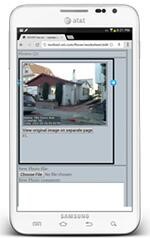These earthquake training resources are designed to help users obtain the knowledge, tools, and support that they need to plan and implement effective earthquake mitigation strategies.
National Earthquake Technical Assistance Program (NETAP)
The National Earthquake Technical Assistance Program (NETAP) is designed to help state, local, and tribal governments obtain the knowledge, tools, and support that they need to plan and implement effective earthquake mitigation strategies. Resources available through the program include instructor-led training courses, technical assistance, tool-development aid and special-project support.
Browse NETAP Training Courses
See All NETAP Resources
QuakeSmart
QuakeSmart is a FEMA program that guides businesses and organizations of all sizes to identify potential vulnerabilities and learn ways to reduce earthquake-related losses.
Rapid Observation of Vulnerability and Estimation of Risk
ROVER, Rapid Observation of Vulnerability and Estimation of Risk, is FEMA’s free mobile software that automates the paper-based screening procedures taught in FEMA P-154 and ATC-20. The recently updated ROVER Version 2.0.1 includes many productivity-enhancing features, including:
- Works on any device with a web browser and data connection
- Includes RedROVER, software for exporting ROVER pre-earthquake data to FEMA’s HAZUS-MH 2.1
- Screen layout automatically adapts to the data-entry device: smartphone, tablet, or PC
- Remotely manage screening
- One-time data entry to a built-in database
- Capture digital photos and geolocation
- Import pre-existing data
- Integrates with USGS ShakeCast (ROVER Edition) for seismic monitoring of buildings

An updated edition of FEMA P-154 ROVER CD will soon be available from the FEMA Publications Warehouse. The beta version of ROVER and an updated user manual are available from the user group ROVER Ready Alliance.
Rapid Visual Screening of Buildings for Potential Seismic Hazards
Rapid Visual Screening of Buildings for Potential Seismic Hazards: A Handbook Third Edition (FEMA 154) is a paper-based method to rapidly compile a building database from field observations. This pre-earthquake screening tool is widely used to inventory portfolios of buildings and to identify those that might pose a risk in the event of earthquakes and warrant additional study. The FEMA 154 process helps a building owner address the greatest risks and prioritize building evaluation and rehabilitation.
Training Publications
The Federal Emergency Management Agency (FEMA) develops many Earthquake Publications Related to Training used by building designers, managers, regulators, and others for self-study and instruction in how to reduce the seismic vulnerability of new and existing buildings and their contents. In addition to print, online, and CD-based publications, these resources include presentation slides, course videos, and recorded webinars.
Other FEMA Earthquake-Related Training
FEMA’s National Preparedness Directorate provides a large number and variety of training courses through its National Training and Education Division (NTED), Center for Domestic Preparedness (CDP), and Emergency Management Institute (EMI). NTED and the CDP focus on training for first responders and other state and local government personnel involved in responding to natural and man-made disasters, including earthquakes.
In addition to courses about responding or preparing to respond to earthquakes and other disasters, the EMI also provides hazard mitigation training. Mitigation courses show states and localities how to assess and reduce risks posed by earthquakes and other natural hazards, and how to obtain grant support from FEMA for hazard mitigation activities. EMI training is offered through classroom-based courses provided by the EMI or by states, and through online independent study courses.

For more information on training offered through the EMI, NTED, and the CDP, go to the National Preparedness Directorate Online Course Catalog.

